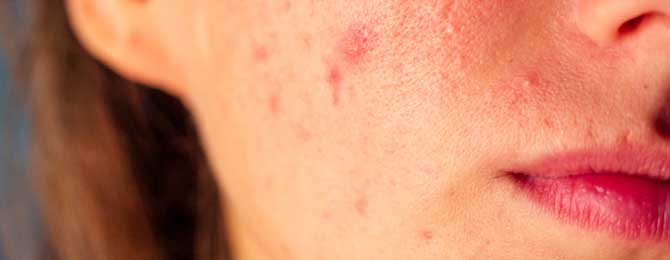How to Get Rid of Acne?

Acne is a skin condition that affects nearly everyone to some extent as they pass through puberty. The proliferation of pimples on your face isn’t any type of serious health risk, but it sure does cause a lot of angst and self-consciousness for young people. It’s caused by excess sebum production that clogs pores and results in the ‘blackheads’ that are telltale signs of acne. In worst cases acne can actually scar the skin, but even those who have the mildest cases of it will want to know how to get rid of acne.
Now if it were possible to stop being an adolescent and having hormones going wild then it would be that easy and you wouldn’t have to ask how to get rid of acne. But that’s doable in any way and every kid is going to find themselves in between childhood and adulthood eventually. So what can be done to reduce acne if not’s possible to get rid of it?
Washing your face with a medicated cleanser and applying acne cream are token responses, and for youngsters with mild acne that may be all that’s required. But for other people some type of effective prescription acne medication may be required. There are a number of them and a prescription for one may be how to get rid of your acne more permanently.
How Acne Medications Work
Acne medication works in two ways; it has substances in it (salicylic acid most notably) that clear off the oil and / or dead cells clogging pores and other ones that have antibacterial and antifungal properties to kill the bacteria (benzoyl peroxide most notably) that grow in those clogged pores. Acne medication also promotes the dispersion of excess sebum, and is very effective because by doing so it lessens the chance of further acne outbreaks developing. Some medicines are geared to address this function more specifically.
The last way acne medications work is by reducing the inflammation that is triggered by the body because the dirt and bacteria in the pores are recognized as foreign substances. This inflammation compounds the acne problem because it leads to the production of more pus, which then clogs pores even further. Understanding what causes acne is helpful in any effort to find out how to get rid of acne.
Commonly Prescribed Acne Medications
These are the prescription meds prescribed for acne most often. All are available at Canada Drugs Direct for better prices than those offered by local pharmacies in America.
Benzaclin – a combination antibiotic and drying agent for treating acne resulting for over production of sebum in the skin
Differin – The first OTC topical retinoid acne treatment with adapalene, a retinoid that treats acne deep in the pores and prevents new acne. Differin is also popular because there is a less expensive generic version of the medication available as well
Renova Cream – Renova A is vitamin A derivative that’s very effective for treating acne
All 3 of these acne medications have been favorably reviewed by consumers and are considered to be the right combination of safe and effective
Helpful Complementary Acne Reduction Tips
In your quest to learn to how to get rid of acne you’ll want to also be open to more natural approaches. Like most of these types of remedies they won’t be particularly effective on their own, but used in conjunction with your prescription acne medication they may improve your results.
The first one is to use tea tree oil as a natural antiseptic to clean your skin and dry up excess oil reserves. You can buy it at pretty much anywhere and it’s not expensive. For any clogged pores that develop into open sores or wounds you can use witch hazel to reduce inflammation, soreness, and speed the healing process.
We’ll conclude here by saying that one of the best ways to reduce acne breakouts is to eat less fatty, greasy food that is high in saturated. Not only is it bad for your waistline, it also stimulates the sebaceous glands in your skin. More sebum means more likelihood of acne.
Have Questions Or Want To Order By Phone?
Call Toll Free:
1-855-326-3475IMPORTANT NOTE: The above information is intended to increase awareness of health information and does not suggest treatment or diagnosis. This information is not a substitute for individual medical attention and should not be construed to indicate that use of the drug is safe, appropriate, or effective for you. See your health care professional for medical advice and treatment.